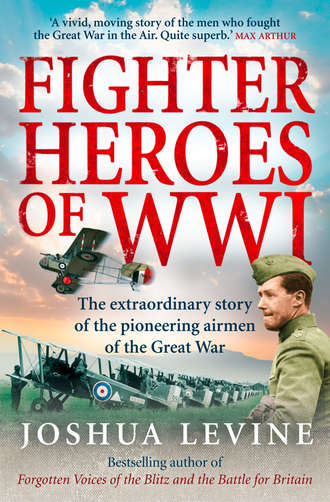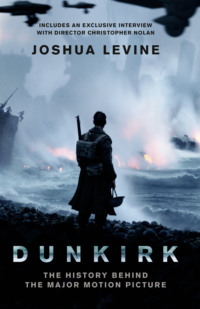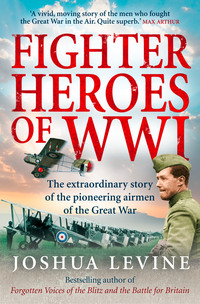
Полная версия
Fighter Heroes of WWI: The untold story of the brave and daring pioneer airmen of the Great War
Once a pilot had received his training, he was assigned to a squadron on active service. He was immediately confronted by his greatest challenge. He had to adapt to the reality of aerial warfare – and he had to adapt quickly. Some pilots were simply inept and no amount of training could make a difference. Harold Wyllie, an observer with 6 Squadron, was enraged by such a man in April 1915. His diary records:
Clarke was dreadfully smashed here today. Ross Hume was pilot and somehow managed to side slip and nose dive to the ground. This is wrong. Ross Hume stalled his machine turning. He was a rotten pilot and should never have been allowed to carry a passenger. Clarke died at 11.50 pm without regaining consciousness, thank God. He was one of the best fellows that ever lived and a valuable life has been thrown away by sheer bad flying.
By 1916, so many pilots were being lost that their replacements were barely trained when they arrived at the front. Cecil Lewis, arriving at 3 Squadron, was one of these replacements:
When I got to France, I only had about twenty hours flying and I was posted to a BE2c squadron down on the Somme. The CO took one look at my logbook and said, ‘My God, it’s murder sending you chaps out with nothing on the logbook. You’d better put in a bit of time!’ So he gave me an aircraft and I walloped off to have a look at the lines, to get used to the French maps, all the things that were different. One had always heard, ‘Behind the lines, this side of the lines, the lines, the lines, the lines …’ But I hadn’t a clue as to what the lines looked like – really from the air – looked like …
John Boon was aware of the fate that awaited many of these schoolboys, like Lewis, who arrived to do a man’s job:
We used to see the young men coming in to the orderly office to receive their instructions as to where they had to go. Then the tenders from the squadrons came to the headquarters to pick up them up. You used to see these young fellows with their brand-new wings, brand-new uniform, brand-new Sam Browne belt. Everything was new and smart. Some of these boys didn’t last twenty-four hours.
On joining the Royal Flying Corps or Royal Naval Air Service, the men of the rank and file were treated very differently from the officers. These were the men – the riggers and fitters and other technicians – who would be responsible for keeping the aeroplanes flying. They joined as tradesmen, but they were trained as raw recruits. William Berry made an inauspicious start:
At my very first parade, the man next to me stood there with his boots all dusty. The sergeant said, ‘Man left and right of him, escort him to the guardroom!’ When we got him there, they made him turn out his pockets and I’ve never seen anything like it. He had nails sticking into bits of toffee, stubs of pencils – it was so funny that I burst out laughing. The corporal in charge of the guard looked at me and said, ‘Laughing on escort – worse crime than the prisoner’s! Get in there along with him!’ So by ten past two on my first day, I was confined to barracks.
The discipline meted out to the recruits was of a traditional military variety. Cecil King:
If we were such a superior corps we had to show it in discipline, especially when walking out. We were expected to set an example to everyone. That’s why all our instructors came from the Brigade of Guards. Our discipline had to be second to none.
George Eddington remembers how the discipline was imposed:
What struck me most was the absolute domination of the routine. From your feeding, to your sport, it was all routine. You were made to realize that you were there to do as you were told and not to ask questions. Even a simple thing like turning right or left had to be done just so. Squads were formed in fours, which meant a complicated movement of the feet. The food was not too good at all. You were only allowed out of camp with a pass and you were allowed once a week, until eleven o’clock. You were made to feel that you were nobody at all. You were a soldier first and last. The instructors were, without exception, warrant officers, Guardsmen. They felt that a new-fangled thing like the Flying Corps was a lot of poppycock, and a waste of good men, and they didn’t forget to let us know. We weren’t made to feel that we were technicians. We were soldiers in the King’s army: ‘You are not a superior breed! Get rid of that idea as quick as you like!’
William Berry had a favourite NCO:
I remember Corporal Newbolt. He could have been acting unpaid for all I know. He was six foot odd of brute strength and he would come and put his face by your cheek, within two or three inches – and he would yell at you, ‘Do you know Mrs Newbolt?’ ‘No, Corporal.’ ‘Well, you’ll jolly well know her son!’ He didn’t say ‘jolly’…
Cecil King discovered that the smallest act could breach army regulations:
I remember walking through Aldershot and it came on to rain. I was wearing an overcoat, and I turned the collar up. All of a sudden, I heard a man shouting behind me, ‘That man!’ and I looked round. It was a military policeman on a horse and he said, ‘Do you know you’re improperly dressed?’ I said, ‘No.’ He said, ‘How long have you been in the service?’ ‘Two months.’ ‘Well,’ he said, ‘you’ve turned your collar up without orders. You’ll put it down in the proper manner.’ I didn’t argue the point. I turned it down. But it made me wonder why we had to have an order to be permitted to stay dry.
For some of the men the discipline proved unbearable. Edgar Wooley remembers an uprising in the ranks:
Amongst ourselves we decided we just could not stand the methods our military tutors were adopting. They were acting as a brake on our ability to do our technical training. They were preventing us from making progress as wireless operators. So we rebelled. We refused to carry on our technical training whilst the military training and discipline were so exacting. Word soon got round to those higher up and officers came along to find out what the trouble was. These officers picked out six men of our section – the assumed ringleaders. They were sent to Headquarters at Farnborough and sentenced to twenty-eight days’ confinement. During their confinement, they were visited by a military parson who, on questioning one of them, was surprised by his intelligence and his desire to be a good soldier and a good wireless operator. The parson asked him why he was there. The soldier told him of the recruits’ dissatisfaction at the treatment they had received at the hands of their military trainers. As a result of this discussion, the parson made a report to certain officers and the matter was brought up in Parliament – why was the Royal Flying Corps attempting to institute Prussian military methods into the British army?
Ultimately the six prisoners were released and the sergeant major in charge of training was relieved. He was replaced by another sergeant who found us to be a very satisfactory, efficient body of recruits – much to his surprise – and he couldn’t understand why we had acted as we did unless there were justified reasons for it. He said, ‘I want you now to be good soldiers and if you do as you’re told and you continue to do your work properly, we shall get on very well together.’ And that’s exactly what we did. When he reluctantly left us, we made him a presentation. We found out that this hefty, jovial, soldierly sergeant was a big pipe smoker so we were only too pleased to give him a couple of pipes in a case. He was clearly very pleased – and surprised.
Irish charm made S. S. Saunders’ life a little easier:
Sergeant Major Waddington from the Guards was a gentleman off parade, but a bastard on parade. I found that I could say things to him which he took in a good way because I was the only Irishman, and he sort of took things from me. One day, he put me on the Awkward Squad, because I wasn’t properly shaved. The Awkward Squad was a squad which Sergeant Major Waddington took himself after lunch. We had to get on parade with our full kit including rifles and full pack. And he’d drill us like hell up and down there for about an hour. And then he’d dismiss us.
Well, we were issued with rifles which the Infantry had had for some time, and some of them had been lying in the mud for ages and practically rusted through. They were cleaned up and issued to us. Well, I had a rifle one day on the Awkward Squad and we were doing a drill where you pull back the bolt and hold the rifle in a certain position so that the inspecting officer can look down the barrel, and see that it’s properly clean. We had done this four or five times but Sergeant Major Waddington wasn’t satisfied. He said we weren’t all together and we weren’t making enough noise. So he shouted, ‘Pull the bloody thing back till you break it!’
So I pulled the bolt, and when I did, it came away in my hand and left the head in the rifle. I just remained in the same position I was in, with my right forearm parallel with the ground and the bolt in my hand. He looked at me and he said, ‘What the bloody hell’s wrong with you Saunders?’ And I said, ‘Nothing sir. I’ve obeyed the last order. I’ve broken the bloody thing.’ The other chaps were getting a side glance in and he chewed them up. He shouted, ‘Look to your front!’
He came over and he looked at me and I could just see a slight suspicion of a twinkle in his eye and he turned round to me and he said, ‘Get off this squad immediately. You’re too bloody awkward for the Awkward Squad. Dismiss!’ So I hadn’t to go on any more on the Awkward Squad, but the other fellows had to make up for it.
For William Hawkins of the Royal Naval Air Service, the end of a day’s basic training brought a soothing recreation:
When I was training at the Crystal Palace Depot, square bashing, route marching and rifle training finished at about 5.00 pm and then, in the evening, we had dancing. There was no one of the opposite sex so we had to dance with each other. We waltzed and we did the Boston two-step – the old-fashioned dances. It was quite a lot of fun, actually.
Конец ознакомительного фрагмента.
Текст предоставлен ООО «ЛитРес».
Прочитайте эту книгу целиком, купив полную легальную версию на ЛитРес.
Безопасно оплатить книгу можно банковской картой Visa, MasterCard, Maestro, со счета мобильного телефона, с платежного терминала, в салоне МТС или Связной, через PayPal, WebMoney, Яндекс.Деньги, QIWI Кошелек, бонусными картами или другим удобным Вам способом.





